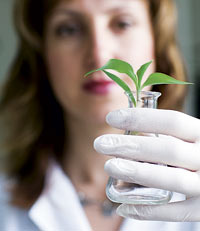EU grant for Scottish pesticide reliance reduction project

Reducing farmers’ reliance on pesticides in the subject of a £600,000 EU research grant awarded to the The Scottish Crop Research Institute.
The money, part of a €12m (£10.46m) research programme, will be used to study the integration of different methods for controlling weed and pest numbers, reducing farmer reliance of standard agrochemical products.
The declining chemical armoury and increased EU concern for pesticide residues on crops were the key drivers for the funding. Wheat, maize, field vegetables, apples, pears, grapevines and vegetables grown under polytunnels, will be the main crops researched.
The EU PURE project (Pesticide Use-and-risk Reduction in European farming systems with Integrated Pest Management), which will develop integrated pest and disease management techniques, is the biggest agricultural project funded by the EU under the Framework 7 programme with a total value of €12m. SCRI will receive £600,000 funding over four years.
SCRI will contribute to several areas of work covering conservation of beneficial insects, landscape engineering, and novel ways to increase plant defences using elicitors. The institute will also serve as a test site for new Integrated Pest and Disease Management (IPDM) strategies in wheat and brassica production systems.
Dr Graham Begg, of SCRI’s Environment Plant Interactions programme, who will lead research into the role of ecological engineering in IPDM said, “With the reduction in available pesticides, growers will have to look to different and more innovative methods of managing crops and the PURE project will support that move”.
Dr Nick Birch, who coordinates SCRI’s input said, “The aims of the project are also closely linked to research funded by the Scottish Government’s Rural and Environment Research and Analysis Directorate that focuses on more sustainable agriculture, food security and the impacts of environmental change.”

